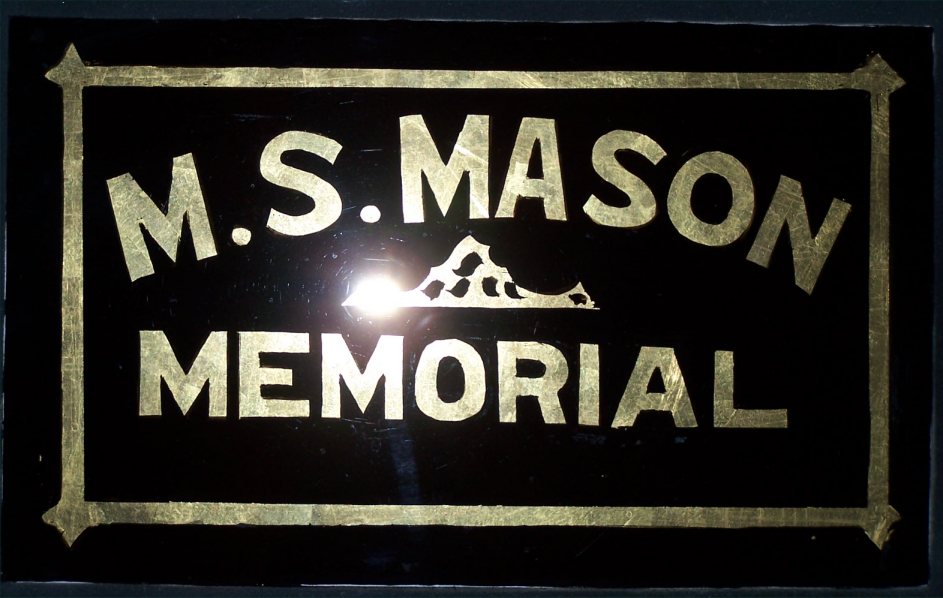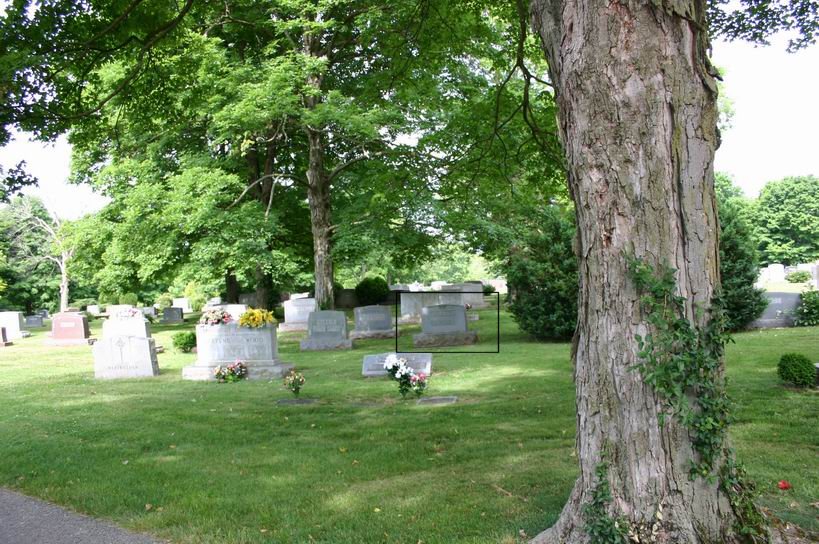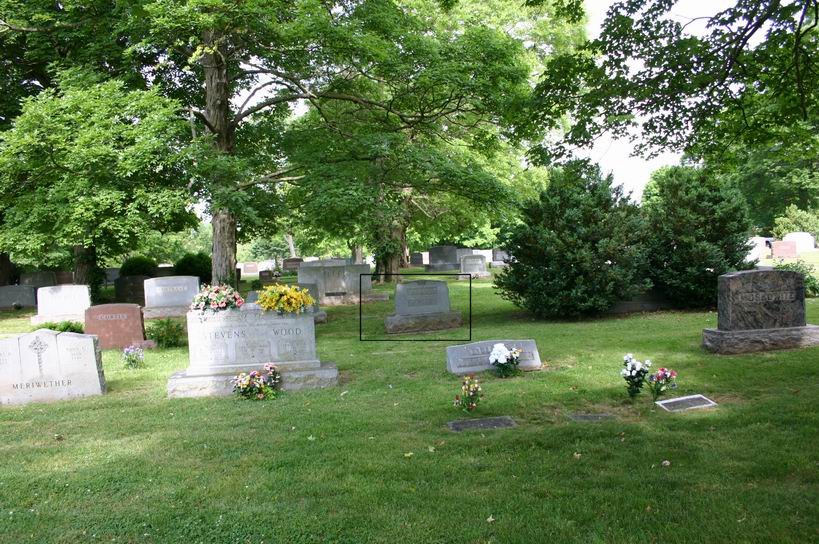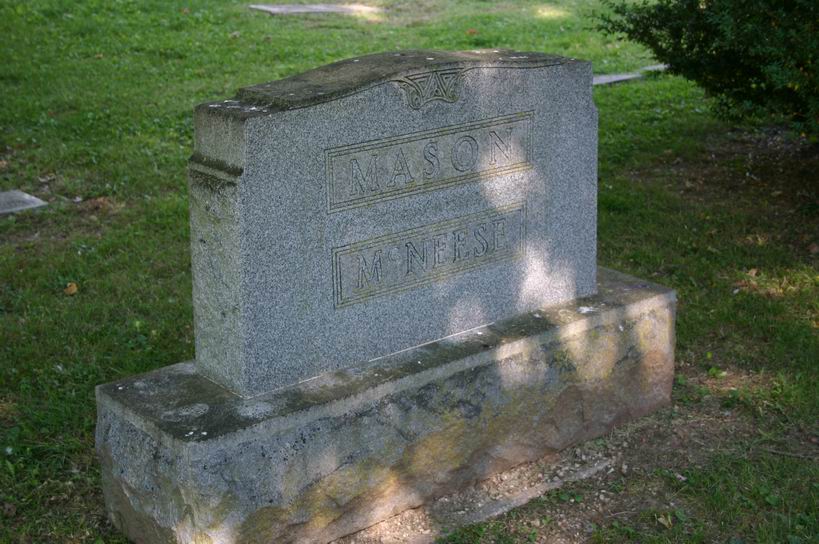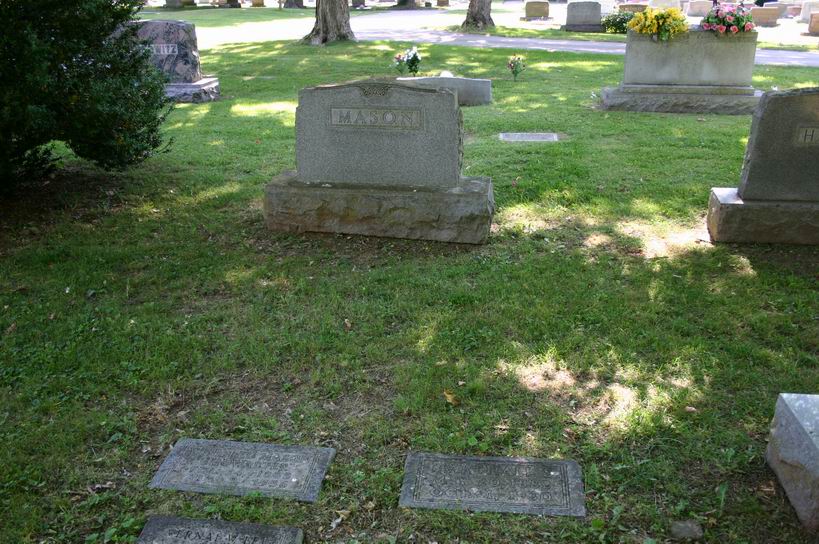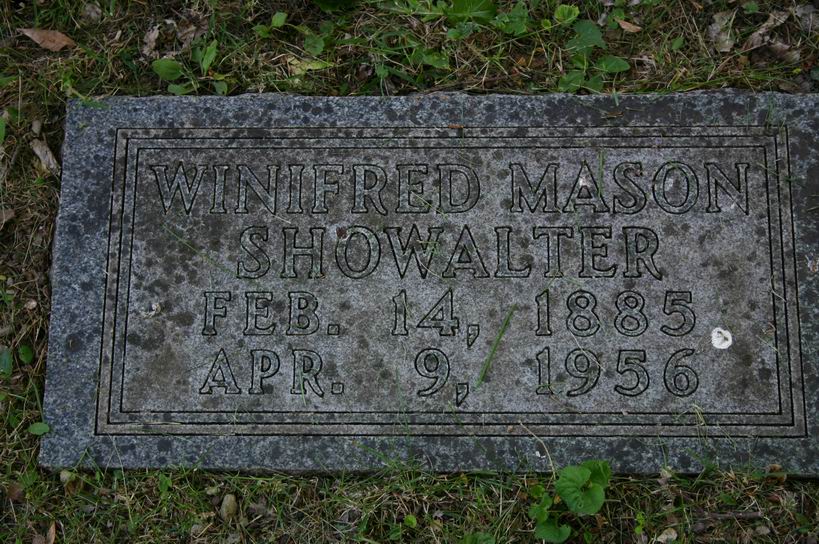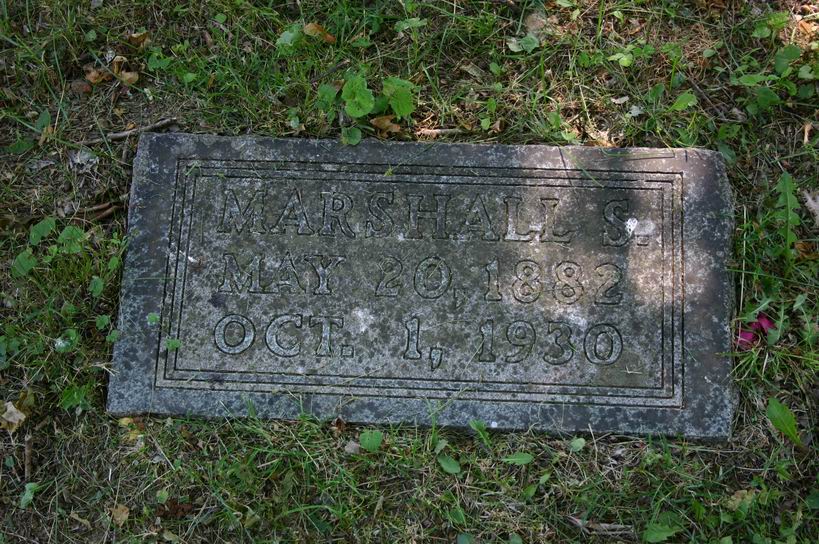Marshall Spencer Mason
1882-1930
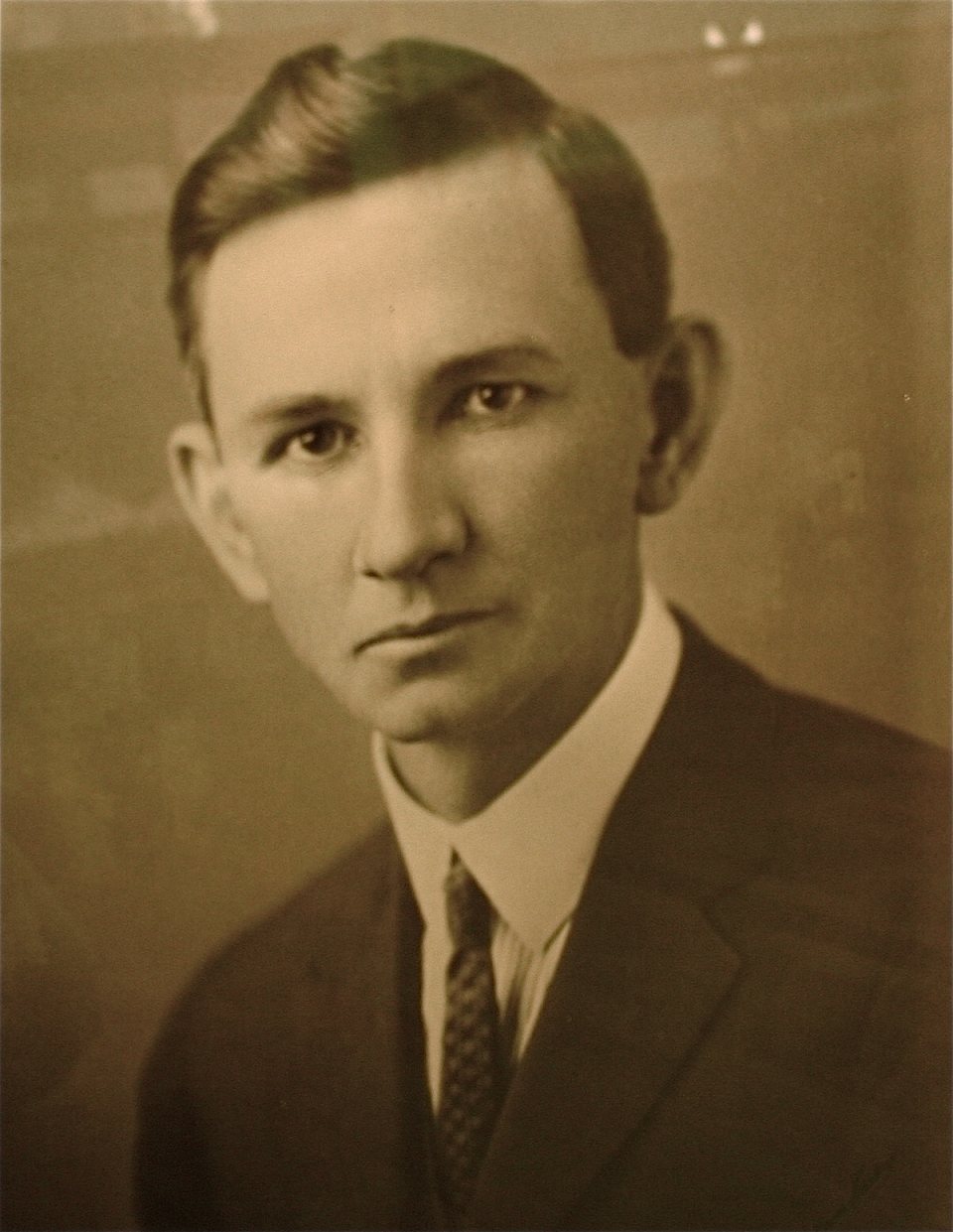
Used by Permission
(Copyright F-HU)
Table Of Contents
The Life of M.S. Mason
The Facts As To The Death of M.S. Mason
He Dies A Martyr
General New Item, The Christian Worker
The Last Journey, M.S. Mason
Neighbors, by M.S. Mason
My Friend, Rue Porter
As I Knew Him, W. Curtis Porter
Report of Grand Jury
Daily Citizen Report - October 2, 1930
Daily Citizen Report - October 30, 1930
The Tribute To M.S. Mason At Freed-Hardeman College
Directions To The Grave Of M.S. Mason With Pictures
The Life Of M.S. Mason
While Arkansas cannot claim Brother M. S. Mason as a native son, she nonetheless can claim a great portion of his life's work, and did in the pursuit of the work, claim his very life. He, therefore, certainly belongs to the Arkansas Angels.
Marshall Spencer Mason was born May 20, 1882 at Lambs, Illinois, the eldest of five children. The children were robbed of their mother by the death angel when Spencer was eight years old, and they were scattered among relatives. Spencer was taken into the home of an aunt, who was religious and zealous, and from a child he knew something of the beloved scriptures.
When Spencer was seventeen his father married again and gathered his family together at Strafford, Missouri. A Brother Roberts of Springfield, Missouri and other friends aided the young man and he obtained higher education in the colleges of Springfield. In 1902 he began a successful teaching career.
I have been able to reconstruct from the pages of the Memorial editions of The Christian Worker the life of Brother Mason. These were published under the dates of October 30 and November 6, 1930. Let me now tell that story in the words of others.
“My first acquaintance with Brother Mason was before his con
version. I was associated with John R. Williams in a meeting at Cardwell, Missouri in June, 1911 and there came in contact with M. S. Mason. He was teaching school in the country near Cardwell at the time. The meeting continued through three weeks, but it was not until toward the close of the first week that Brother Mason began attending the services. He was a Methodist, but sincerely seeking the truth of Almighty God. His religious experience had led him to the point where he was not satisfied and he was seeking and inquiring for something 'more substantial reasonable, and more in harmony with the word.' His presence in the service during the meeting was noted with regularity, and his deep interest was evidenced in no uncertain way.” —Ealen V. Wilson
“Perhaps there is no man in the brotherhood who had been more closely associated with Brother Mason than myself. In the year 1911 he came to the town in which I lived to teach school, and roomed with me that year. He had just obeyed the Gospel under the preaching of the prince of preachers, Brother John R. Williams, and much interested in the study of the Bible. I soon saw that he was very studious and earnest, and suggested that he devote his life to preaching the gospel. He at first declined the idea, but later agreed to, provided I thought he could succeed and that I would assist him. This I agreed to, and he soon began preaching and continued until called above.” —James E. Laird
“M. S. Mason was comparatively young when I first met him. He had not yet preached his first sermon. He impressed me as a young man of ability, integrity, and earnestness. He was even then a careful student of the Scriptures, able to explain many profound truths. I do not know whether or not I heard his first sermon, but I heard many of his efforts in the first few years of his work in the ministry. I predicted great success for him, and often expressed that hope to others. As the years rolled on, my predictions were verified.” —James L. Amis
“He was invited to become president of Monea College at Rector, Arkansas and decided to accept the invitation on one condition—that Brother James E. Laird come and be a co-worker with him. That arrangement was made, and there the two men blended their lives and their loves in the one great purpose of preaching the gospel.”—L .O. Sanderson
“Brother Mason was chosen president of the then Monea College at Rector, Arkansas, said, he would accept· the position on the condition that I would join him in the work, which I agreed to do, and we were associated in that work for years.”—James E. Laird “It was during his teaching work at Monea that Brother Mason was married to Winnie Boles, of Rogersville, Missouri, to whom he had been introduced by Brother Clayton Gall. Immediately following their wedding, which was on May 23, 1914, they went to Monea to continue the work another year, after which they returned to the Ozarks, the choice home-spot of Brother Mason. Their home was made at 740 Normal Street, Springfield, where they have lived since, and where Sister Mason expects to remain.”—L. O. Sanderson
“I am now in a very interesting meeting at Cave-in-the-Rock, Illinois, the boyhood home of Brother Mason.
Fifteen years ago (1915 BEM) last June Brother Mason and I made a missionary tour of this section. We found an old meeting house in which there had not been a service held for nine years. Briers were ten feet high all around the house, the boughs of bushes had grown in through the windows. We borrowed axes and hoes, cleared away the briers, and bushes; ate our dinner off the briers, went out on foot over the hills and rocks and advertised our meeting. This was the beginning of the congregation that now worships at "Old Antioch," in Hardin County.
Brother Mason baptized four during this meeting. Since that time I have visited this congregation, for three years monthly and then yearly. Brother R. E. Henson, now of Memphis, labored with them three years.
“During this fifteen years many precious souls have responded
to the gospel call; and quite a number have gone 'Home'.” —A. H. Lannom
Brother I. W. Essex reports that Brother Mason held a meeting at Cure-All, Missouri in 1922. This is now the Gospel Hill church 12 miles west of West Plains, Missouri.
Brother Earl E. McCord stated that he met Brother Mason in 1923 and was associated with him in meetings as a song director. He says, “I dearly loved him as a gospel preacher, brother, and associate. He had the biggest heart for the singer of any preacher I was ever with.”
"I think it was in 1923 that I first met M. S. Mason. It was at the County Line Bible School conducted by Brother S.C. Garner. (Fulton-Baxter Co., Arkansas, BEM). Brother Garner became ill, and Brother Mason came to finish out the term. I am glad it was my privilege to sit at the feet of Brother Mason as a teacher. Whatever success I may attain as a preacher of the gospel, Brother Mason had a part in it. From the time we met until he was enrolled as a martyr, we were warm friends. He was one among the best and greatest men in the brotherhood. When the sad message of his death came to me, I wept.” —Tillman P. Pope
“In the passing of Brother Mason, I can truly say I have lost the best friend I had among the preaching brethren. I met him for the first time in June 1924. I was attending Teacher's College in Springfield. The next summer I attended Business College in Springfield. After making a talk at the Broadway and Madison congregation, Sister Mason urged me to go to Wichita and study under Brother Hinds. She raised the money in that congregation and I went. Since that time the Masons have been close friends, and Brother Mason was my advisor. I advised with him before going to Freed-Hardeman.” —Clyde C. Corner
“When we launched the move in 1926 to establish the Arkansas Christian Home, Brother Mason was at the first meeting, and was chosen one of the directors and has served as such as one of the most valuable men on the board. Besides acting as director, he constantly worked, talked, and did all in his power to make the home a success.” —James E. Laird
“I met M.S. Mason about four years ago, (1926, BEM) in connection with the work of the Arkansas Christian Home!” —Lee P. Mansfield
“I use the pronoun ‘we’ to include other members of the faculty and the student body of Freed-Hardeman College. Brother Mason was unknown, personally, to nearly all of us, before January, 1927. At that time, he, together with Brother C. L. Wilkerson, came to Henderson to take a special course of study that was being offered by the school for the benefit of preachers and other church workers. He only spent two weeks with us at that time, but long enough to make a lasting impression. He was invited to address the general assembly of the school once or twice while he was with us, which he did to the delight of everyone present.” —L. L. Brigance
“In the latter part of the school session at Freed-Hardeman College of 1927-28, I first knew Brother Mason. Here he had come to teach in the college in the absence of Brother N. B. Hardeman, president, who was away in meetings in Nashville and Detroit.” —John Fairs Nichols.
Brother C. E. Smith writes that he was called to Knobel, Arkansas in June 1928 to assist Brother Mason in a meeting there by directing the song service. He also directed the singing in the last meeting Brother Mason held, which was at Imboden, Arkansas.
“In the spring of 1929 when Brother Hardeman had to be away from the school a few days in one of the great tabernacle meetings in Nashville, the question came up as to who would take his place. The name of Brother Mason was suggested and his selection was immediately approved by all. The invitation was forwarded to him, he accepted it, and thus began his association with Freed-Hardeman College. His work was so satisfactory.” —L. L. Brigance
The last year of M. S. Mason's life is more readily followed. The Gospel Advocate of April 7, 1930 reported that he was to hold a meeting in Union City, Tennessee April 20-May 1; also, a May issue of the Gospel Advocate carried a poem written by him entitled “The Last Journey.” Also, this year, Brother Mason published a book of poems entitled "Lyrics of Life" of which I have a copy.
Brother C. B. Thomas, a student of Brother Mason's at both Monea and Freed-Hardeman, reports, "My last time to be with Brother Mason was during his meeting at Coal Hill, Arkansas last June (1930 BEM). In company with Brother Laird and others, we visited his meeting and heard him preach one of his strong sermons on Christian living based on the third chapter of James.”
Brother Clyde C. Corner mentions seeking his advice in July on attending ACC, which he was advised to do and which he did. August 21 Gospel Advocate reported that he had good meetings at Mammoth Spring and Lynn, Arkansas.
In August, Brother W. W. Otey reports he visited him while Brother Mason was in a meeting at Foss, Oklahoma. September 9 issue of Gospel Advocate reported baptisms in this meeting. His next meeting was at Ash Flat, Arkansas. C. E. Smith directed the singing. He went next to Dell, Arkansas, then visited home; and then conducted a meeting in Imboden, Arkansas, his last. Of it, Brother J. H. Curry wrote, “No man of God was ever more beloved by the brotherhood of Northeast Arkansas than was M. S. Mason. I had the privilege of hearing him on Wednesday night before his death, on the phrase, “In Christ.” “What a wonderful discourse it was.”
Brother Lacy Holt said, "When Brother Mason left Imboden, Arkansas on Monday before his death, he had closed our meeting that morning at the water's edge. Sixteen had been baptized and one restored.
Also as a staff writer of the Christian Worker, he was sorely missed. Brother Homer E. Moore, editor; wrote, “Brother Mason was our oldest regular writer. He began shortly after the paper was established. When the lamented D. F. Broadus, founder of the Worker, passed to his reward, Brother Mason was put on the first page. He wrote the first and fifteenth of each month, and in all these years he' never missed. The next morning after the hearing of his death, I eagerly watched for the mail carrier, for it was time for his article to come in. I was not disappointed. It came.”
He was also a staff writer for the Gospel Advocate. Several articles were printed in 1930 from his pen.
![]()
The Facts As To The Death Of Bro. Mason
“I have received a number of requests from brethren and friends of Brother Mason for the details as to his tragic death which occurred at the home of Brother Joe Miller, when he was shot by John Miller, the father of Joe Miller, at the home of the latter, about six miles northwest of Judsonia, White County, Arkansas, on October 1, 1930: about 6:45 P.M. and I take this means of making the details public.
Brother Mason had been invited by the Bethel Grove Church which is located about five miles northwest of Judsonia, to hold a meeting, and had arrived at the home of Brother Joe Miller, where it had been arranged for him to stay during the meeting, on the afternoon of September 29th, beginning the meeting that evening.
The family of Brother Joe Miller consisted of himself, his wife, three small children, and his father and mother who made their home with him.
About thirty years ago John Miller obeyed the gospel, and attended church for about ten years, when he became dissatisfied over some trivial matter and quit the church. He never openly denounced the Cause or had any grudge against any particular preacher or preachers. He lived with his son Joe, periodically for several years, as had also his wife, although they had been estranged during this time.
Many preachers have made their home with Joe Miller during this time while holding meetings for this church, but not until this awful tragedy occurred had John Miller ever done more than to ignore them. On this occasion he had acted about as usual, except that he had refused to eat his meal at the table with Brother Mason on one occasion during the time he was in the home, stating to a member of the family that he did not like the company they had.
The family was preparing for church, except the father. Joe Miller goes to field to examine some hay, Brother Mason goes into sitting room to wait. Paul goes to get some crayon for Brother Mason, Sister Miller finishing her preparation goes to the car in back yard, John Miller enters the room and fired the full charge of one barrel of the gun striking Bro. Mason just back of the right ear. Brother Mason had no warning. When the shot was fired the electric light switch was jarred off, and that part of the house was left in darkness. Alfred Miller, Joe's brother, who lives on same farm, arrived, rushed into the house and disarmed his father, and he, in company with a neighbor took John Miller to Searcy, the county seat of White County, where he was delivered to the Sheriff. His trial will be in January, 1931.
This terrible tragedy was such a shock to the other members of the family of Joe Miller that they were prostrate with grief. Nobody who knows the facts hold any other member of this family to blame in any degree, as they had no inkling or warning of the impending tragedy. We know there was nothing they could have done to have anticipated or prevented it. The entire community, as well as the citizenship of White County, generally deeply regret the sad affair and extend heartfelt sympathy to the friends and relatives of this good man who has been sent to an untimely grave. —J. OSCO YINGLING
Bro. Roy Bixler preached the funeral. Burial was in Springfield, Mo. Brother and Sister Mason had one daughter, Alma.
—Arkansas Angels, by Boyd E. Morgan, pgs.128-133
Editor's Note: Tom Childers recently brought it to my attention that Mason's wife, Winifred Mason Moore Showalter, was remarried to H.E. Moore, editor of the The Christian Worker, after the death of Brother Mason. Later, after Brother Moore's death in 1941, she remarried G.H.P. Showalter. After Showalter's death in 1954, she returned to Springfield, and died in the spring of 1956. She was the founder and editor of the Christian Woman magazine for 21 years, that she was married three times in her life, and that all three of her husbands were gospel preachers, and writers for brotherhood journals, the last two of which served as editors.
He Dies A Martyr
Brother M. S. Mason was shot and killed at Judsonia, Arkansas At 6:30 p. m. October 1, 1930. See Office Notes for a few particulars. A Special memorial issue will be published soon.
-Christian Worker, Vol. 16, No. 34 (October 9, 1930): 1.
General New Item, Christian Worker
The greatest shock we ever had came to us last Wednesday night about mid-night when Brother C. L. Wilkerson called us over long distance from Springfield, Mo., and informed us that Brother M. S. Mason had been shot and killed. We expect as soon as we can to get out a memorial number, and will not go too much into detail now.
He was holding a meeting in Arkansas. At about 6:30 the brother with whom he was making his home, told him he wanted to go out and see about some hay before going to meeting. Brother Mason replied that it would be all right as they had plenty of time. Brother Mason sat down in a chair, and picked up his Bible to look over his evening sermon, and was sitting there, no doubt meditating on the lesson, when the old man came in behind him with a shot gun, and being so close to him when he fired that the entire load went into the back of Bro. Mason's head killing him instantly. As reported, the first statements by the old man was that he did not like any preacher.
Through the kindness of Brother and Sister Beach Maple we were afforded a nice auto ride to Springfield and attended the funeral services. Brother [L. O.] Sanderson had charge of the services, and gave a splendid talk, after which ten preachers made two-minute speeches each, and there were several preachers present who did not speak. By an actual count, as the people passed the casket, there were over one thousand people there. A few of the many telegrams were read, and the names of all who sent telegrams were read, and besides these Sister Mason had received a large number of letters of condolence.
The floral offerings were the greatest I ever saw. And I only wish I had the descriptive power of Brother Mason so I could give you a faint idea of the beautiful way in which they were arranged. And then if I could picture [for] you the beauty of that country to which Brother Mason has gone where flowers never fade.
I was never at a funeral before where so many preachers were present, and where tears flowed more freely.
Brother Mason's last article was mailed the day before his tragic death, and reached us the next morning after the news of his departure. This article we are holding for his special memorial edition of the Worker, which will be published in two or three weeks. We hope the brethren will send in their article early so we can have plenty of time to line up the issue in an appropriate way.
-Homer E. Moore, "General News Items," Christian Worker, Vol. 16, No. 34 (October 9, 1930): 4. (Article contributed by Terry J. Gardner)
The Last Journey
By M. S. Mason
I often muse when I have "packed" my grip,
Arranged each separate thing
With thought and ample care:
Just for another short or longer preaching trip
And called the station-man about my
Time and fare,
On that long journey I must make some day,
When life and love and labor all have passed
To that bright land, so sweet and far away,
My longest journey, the most solemn
and the last.
I shall not leave on that trip to return;
I'll bid home a long, eternal, last farewell,
No homesick heart need in that country yearn,
Nor e'er await the tales, returning travelers tell
The parting kiss, the loving fond embrace,
With loved ones on this side, I'll not renew,—
‘Tis only they shall see me face to face,
When they have made the last long journey too.
I shall not take my Bible, when that way I go
By years of prayer and study I shall learn the road:
Those things at which my faith has wondered I shall know,
When I have reached the spirit's last abode,
I shall not need that book to others teach,
My mission will be o'er when the clear call has come;
I shall not journey to the place to preach
But rather meet the one I've guided home.
I shall not take a change of raiment then,
These temporal garments can not suit the realm up there.
I trust when I have quit the earthly walks of men,
To wear the wedding garment clean and fair.
This poor attire, down here, has served me well,
For what it did, it has been well worth the price;
But shabby goods that merchants buy and sell
May well be doffed for robes of Paradise.
Not one companion shall I have on that long road
For those, who make the journey go alone:
Each traveler bears the weight of his own load;
The path is only wide enough for one;
We can not watch together as we walk,
We see before the journey has begun,
Or after all is over we can talk
About the things we've thought and
said and done.
I shall not carry any purse along that route,
My Savior, long ago, has paid my fare:
I sign for passage, board and all throughout,
And travel as my Savior waits me there.
For dollars purchase what our bodies want and need.
They pay expenses, while we journey toward the goal
The price of Heaven, made a Savior bleed,
The life of Jesus brought the human soul.
Lord teach me, in my visits, here and there,
This last long trip to always bear in mind:
And though my earlty treasures be but rare,
Teach me, at last they glorious realm to
Find: For what will all this old earth mean to Me
If, when my body rests beneath the sod.
If when my Savior's face I can not see
If my path leads me not to God?
--From Lyrics of Life Re-printed in the Christian Worker, Vol. 16, No. 45 (January 1, 1931): 3. (Article contributed by Terry J. Gardner)
Neighbors
by M.S. Mason
My neighbor and I had a falling out,
We almost came to a terrible bout.
I simply told him a thing or two
And he fired back till the air was blue;
Thunder and lightning rent the air,
And we talked so loud, made the neighbors stare;
And when we were talked almost to death,
We both retreated to get our breath.
And then I thought what I had done,
As I hid myself in my room alone;
What value of life I had thrown away
In a fit of temper that fateful day;
What an empty place in my aching heart,
What a tragic thing when two friends part.
What a tribute to Anger my soul had paid,
And what a difference all this made.
I thought of the time when the baby died,
And I sat in darkness and cried and cried;
And Jim came over and grasped my hand,
And pointed my thought to the better land;
With voice so gentle, he calmed my fears,
And out of the shadows and through my tears
A rainbow of hope loomed up in the sky,
And the valley of the shadow of death passed by.
I thought of the times, so many, too,
When tasks came up I couldn't do;
And I called to Jim for he knew how
To fix the hose on the garden plow,
To repair the walk or the guttering spout,
At the rusty place where the rain ran out;
For I could preach and read and write,
But Jim, he had the mechanical sleight;
He could sharpen a scythe, make a mower run,
Ah, Jim was a prince to get things done.
And I thought of the times when skies were gray,
And the chill and gloom of a winter's day;
When time dragged heavy, and all about
The northern clouds shut the sunshine out;
That Jim came over to see me awhile,
Brought the latest news and his cheery smile;
Or we sat when the evening sun was low
Or called cross the way in the twilight glow;
'Bout the latest work that the world had wrought,
Or the change of weather the day had brought.
I counted them over, every one,
And the more I thought what my wrath had done,
The more I saw the fearful cost,
Of the morning's fray, and what I'd lost;
And I wondered if Jim had been thinking too,
And if I'd advance what he would do
To heal the breach and forgive the sin,
And make us again what we once had been.
So I watched my chance, and one quiet day,
While Jim was cutting his weeds away,
Right close to the line 'tween him and me,
I was watching him from my cherry tree;
He knew I was there, the pouting pup,
And he knew I'd see him if he looked up,
I was bound that day to catch his eye,
I was determined that Jim should not get by,
So I coughed right loud and he looked around,
And 'fore his eyes could regain the ground,
I called right loud, "Hello, old Pard,
I was just afraid you'd work too hard;
So come across and rest awhile,"
And he dropped his rake with a great big smile.
And answered the call with an open hand;
With tears in his eyes, said "I understand."
'Tis a week ago since Armistice day,
My window opens across the way;
And there sits Jim a smilin' at me
As friendly as friendly as friendly can be.
An oriole is twittering overhead,
He sings to us both that old scores are dead;
And lovelight glows in the shimmering mist,
And Jim gives his head the old time twist,
And says, "Looks like we might have rain,"
And then I know we're friends again.
Our Master, who taught not for power or self,
Said, "Love they neighbor as thyself"
And independent of hell or heaven,
We can see in this world just why it was given.
'Tis not all a matter of heaven or hell—our service of God.
'Tis e'en doing well, right here were we live,
On this earth of ours
We can tread upon thorns or wander midst flowers.
'Tis entirely too painful to live near a man
And give him no fellowship whenever you can;
In the course of the day as you're passing around,
To always avoid him, to look at the ground,
To feel, should you need him, you others must call,
And to feel that you owe him no service at all.
To forfeit the favors you each can bestow,
And the thrills of the soul only friendship Can know;
To take the most wonderful of all that God hath
And offer it blindly on the alter of wrath.
If once in awhile he does act rude,
There are none of us entirely good.
You never know all the facts in the case,
Or the heinous twists in the human race;
His chickens got out, there were plants misplaced;
His dog dug a hole and the lawn defaced.
But perhaps your cow got on his grass,
And your cat got into his garden sass;
And even if he is all to blame,
These things are not the greatest shame.
A wound in the heart that has no heal,
Is worse than the crash of an auto wheel,
And the roads of affection that hearts entwine
Far exceed in value a green bean vine.
And so may the handclasps we cherish today,
And so may the heartbonds ne'er pass away;
As the years come and go and our locks have grown gray,
May we love one another as we're loving today;
And when deep wrinkles lie on our brow,
May it be unruffled and as peaceful as now;
And when I have entered the angel band,
And pitched my camp on the glory strand,
I'll look 'cross the way for neighbor Jim
And hope I'll live 'long side him.
![]()
Special Thanks to Terry J. Gardner for providing the above special poem that shows the minds of M.S. Mason. In a recent email Terry added: "The death of Marshall Spencer Mason touched the hearts of Christians far and wide in an almost unique way. Some of the outcry was no doubt due to the suddenness and violence of his passing. Some mourned that he left behind his widow and family. Some knew him personally and yet the depth of their connection to Mason was much greater than is often seen. Why? I think Mason connected with people on a personal level because he was able to "condescend to men of low estate" without being condescending. He could see himself as he was and admit his flaws to the whole world. This is a rare quality and perhaps the following poem will illustrate the point. For your reading pleasure and self-reflection, M. S. Mason's poem, Neighbors." 03/2010
My Friend
At two o'clock A. M., Thursday October the second, my telephone rang. I sprang out of bed to answer, as did every other member the family, and heard the voice of Brother J. J. Craker calling from Springfield, Mo., "Brother Porter, we knew you would want to hear as soon as we could get you, that Brother Mason was shot last evening at 6:30." Thus came to me the crushing news. I was stunned. I wrote a dozen letters to brethren in different sections of the country, and wept bitterly. On Friday, I drove up to see Sister Mason. Heroine, noble wife of a Martyr. Bravely and with courage born of faith and hope, she was bearing up nobly.
Marshall Spencer Mason was a man. I know many splendid characters, but in the realm of my recollection there is not a name round which hands more genuine appreciation than his. Student, scholar, teacher, preacher, poet, philosopher, yea, but more, his most outstanding characteristic was the humble yet scintillatingly bright light of pure Christianity. For the ten years past I have known him. For eight years have been intimate with him. Have been in his home, with him among his books, studied with him his sermon outlines, have prayed with him, and rejoiced in his successes.
He was specially known among preachers as the young preachers friend. Genial, goo natured, courteous, dignified, clean in life and speech. A good example both in word and doctrine. As a critic, he was splendid. He knew, when a mistake was made, and without the tiniest trace of egotism or self-importance, could point it our in such a way as to make one appreciate it. His rebuke of sin was often cutting, and his cool and deliberate style of persuaded the wayward to better lives was poignant at times. He was no wit, but there were times when he would thrill one with his quaint humor.
His descriptive powers were definitely his own. His had a trenchant pen. A beautiful Spenserian hand made his letters a model both in style and diction. His language was faultless, and his choice of words would be very had to improve upon. His writings were widely read and much admired. I prize very highly the letters written to me.
As an associate writer for the columns of the Christian Worker, I have learned to depend always on him to offer something interesting. He never failed me. I have sought his counsel concerning sacred matters, and found him safe and conscientious. He was my friend, my brother. I am honored in knowing that. I was glad to be able to attend, with 1500 others, his funeral service. He was splendid while he lived. He was great in death, and is sacred in memory.
I pledged myself over his dead body that I would pray more, study harder, and fight sin more determinedly from this time on. Few, if any, of us will be permitted to give our life's blood as a sacrifice to the cause of truth as he did, but we can give our lives to the service until the end come.
-Rue Porter, Christian Worker, Vol. 16, No. 37-38 (October 30, 1930): 2-3. (Article contributed by Terry J. Gardner)
As I Knew Him
Sixteen years ago, in the summer of 1914, I first met Bro. M. S. Mason. I had just begun preaching, and he had just been elected President of Monea College at Rector, Ark. That fall I became a student of his in Monea College. I learned to love him for his goodness and ability, and through all the years that have passed since I have been closely and intimately acquainted with him.
As a teacher and preacher he was willing and competent. His interest in young preachers of the gospel was known to all who knew him. Over many rough places did he help me in those days when I was young in the work, and his many expressions of confidence in me have been a source of encouragement to me through all these years. He has been instrumental in starting and keeping a number of young preachers in the field. He was willing to sacrifice and suffer for the cause of Christ. He went to many places where the remuneration was small, and in a number of instances donated his services in meetings to laces where they were not able to support him. He was thorough in his preparations and plain in his delivery of sermons. Unemotional by nature, he was, however, sincere and honest in his plea for people to accept the gospel.
As a man he was humble and God-fearing. Like other men he had his peculiarities. Sometimes he was misunderstood, but those who knew him best loved him most. He could adapt himself to all conditions of life. He was not too small to be at home among the most cultured and exact. Neither was he too great to feel at home among the most lowly. Men of every walk and station of life interested him, and in their association he found pleasure.
As a Christian his life was an open book. He believed in his God, and not one evil report did I ever hear concerning him. Men opposed him because of his religion, of course, but they respected him for his cleanness and honesty.
In his attitude toward life and nature he loved all things beautiful. There were rhythm and harmony in all nature to thrill his vibrant soul. To him the evening zephyrs, playing slyly among the leafy branches and beating softly upon his cheek, sang songs of romance and mystery—inaudible melodies, heard only by the ears of the poetic soul. The indescribable glory of the blushing sun as it sank silently in the golden west amid cloud-sentinels of mystic grandeur was but the echo of a deathless theme from the shores of vast eternity. The plaintive call of whippoorwill as it pierced the shades of gathering darkness was a mournful dirge of pathos and tragedy. The twitter, the chirp, the warble, the thrill, of the mocking bird, as wafted to him on the quietness of the morning air, was a melody divine to awaken sleeping souls. The rushing stream, winding its way down the rugged valley dashing in foam and spray over jagged rocks, and leaping in wild cataracts to lower levels as some precipice is reached, was but the fingers of the Almighty striking the chords of nature into a jubilant psalm. The gorgeous hillsides robed in autumn's glory, the distant mountains arrayed in purple mist, approaching dawn plucking the stars and hiding them in her bosom, the brilliant sun shining in strength at noon, and the mantle of darkness lowered when day is done, were but volumes of poetry inspired by the eternal Muse.
And just as the Magic Artist, with brush in hand, was waiting to paint the Ozarks in all her varied colors that have bewildered the brush of every artist who ever saw such trembling glory and puzzled the pen of every poet who ever heard such marvelous song, the hand of death plucked another soul from the shores of earth and transplanted it into the field of Paradise where glories are undescribed. The fragrance of every rose, the romance of every breeze, the song of every bird, the music of every stream, the rhythm of every poet, and the glory of every sunset, will one day fade from the earth; but on the glorified field of eternity, rhythm and son, fragrance and beauty, will hold eternal revel. Thrilled by the song of angels, enrapted by the glories of heaven, on the banks of the crystal river that flows from the throne of God we hope to meet our departed brother.
- By W. Curtis Porter, Christian Worker, Vol. 16, No. 37-38 (October 30, 1930): 3. (Article contributed by Terry J. Gardner)
Report of Grand Jury
White County, Arkansas
Book —1931, Page 2
January 21, 1931
". . .J. Miller who was confined to the State Hospital for Nervous disease for which no bond was required." — Indictment #2
Rev. M. S. Mason, a Christian Preacher, Killed at Clearwater
John Miller Surrenders to Local Officers—No Motive Given
John Miller is alleged to have shot and killed Rev. M. S. Mason at six-thirty p.m. Wednesday at the home of his son Joe Miller at Clear Water, six miles northwest of Judsonia. Miller, accompanied by Mr. Hoofman and his son came to Searcy and surrendered to jailer Wes Hudspeth about nine o'clock. John Miller lived with his son and Mason was staying there while holding a meeting at the school house near there. Mason is a Christian preacher, aged about 40 years; John Miller is in his seventies.
Coroner J. A. Chandler held an inquest and the verdict of the jury was that Mason came to his death by being shot by John Miller. Miller refuses to talk and there is no known motive for the killing. It is said that about fifteen years ago a minister came along and wanted to hold a meeting at this place; that John Miller, then a member of this church objected; that other members of the church permitted the meeting to be held; that Miller quit the church and is said to have been against the church and ministers since that time.
It is also and that just before Miller shot Mason he got up and said to his daughter-in-law that he was going to kill the whole D--- bunch, and at once shot Mason. Mason's home is in Springfield, Mo.; his body will be shipped there for burial.
No arrangement has been made for preliminary hearing.
Following is a list of the members of the coroner's jury: Clyde Froud, C. W. Myers, L. N. Hilger, A. W. Hoffman, Homer Edwards, Ben Thompson, J. C. Meyers., R. K. Waller, F. M. Huff, H. T. Kimbry, Leslie Leasure, W. A. Waller.
It developed at the inquest that Rev. M. S. Mason went to the home of Joe Miller last Sunday to stay while he held the meeting at Bethel Grove; that John Miller was so much opposed to ministers and the church work that he refused to eat at the same table with the minister; that he waited until the minister had eaten and then went in and ate; that Wednesday evening after the minister had eaten he went into the room adjacent to the dining room and sat down to wait until the family was ready to start to church; that John Miller got up from the table and picked up a gun and walked into the room where the minister was and shot him in the back of the head, almost severing his head from his body.
-The Daily Citizen, Searcy, Arkansas, October 2, 1930, Page 1, Contributed by Terry J. Gardner, 04.2010
Slayer of Minister To Insane Asylum
-------
John Miller of Clearwater, Taken Tuesday.
Sheriff J. P. Yarnell carried John Miller of Clearwater to the state Hospital for Nervous Diseases Tuesday. Judge F. O. White had Drs. A. G. Harrison and Sam J. Allbright to pass upon the question of his sanity and they pronounced him a fit subject for the asylum. It will be remembered that Mr. Miller shot and killed the Rev. M. S. Mason on the evening of Wednesday, October 1, 1930, without any provocation.
The Daily Citizen, Searcy, Arkansas, October 30, 1930, Page 1, Contributed by Terry J. Gardner, 04.2010
Tribute To M.S. Mason At Freed-Hardeman University
The impression M.S. Mason made on the students and faculty of Freed-Hardeman University is worthy of note. He was described by L.L. Brigance as a fine writer and philosopher. His sermons were scriptural, logical, and simple. Following the shocking death of this much beloved preacher of the gospel and former teacher, the students of M.S. Mason at Freed-Hardeman College raised funds to refresh and refurbish the classroom where he taught. One of the young men involved was 1930 class president, Hugo McCord. The room still exists as the office of Financial Aid in the administration building on the campus of Freed-Hardeman University in Henderson, Tennessee. (Photos provided by Tom L. Childers).
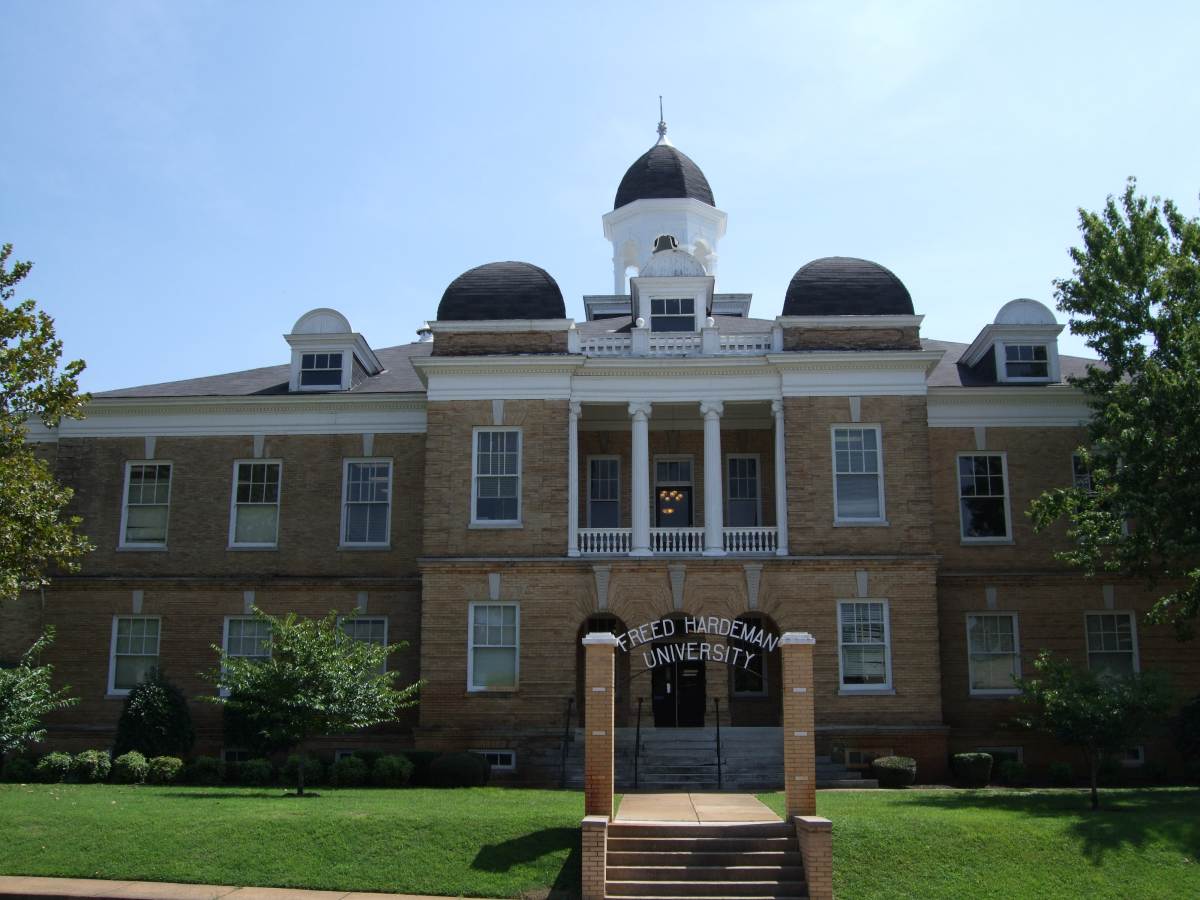
Freed-Hardeman University Administration Building
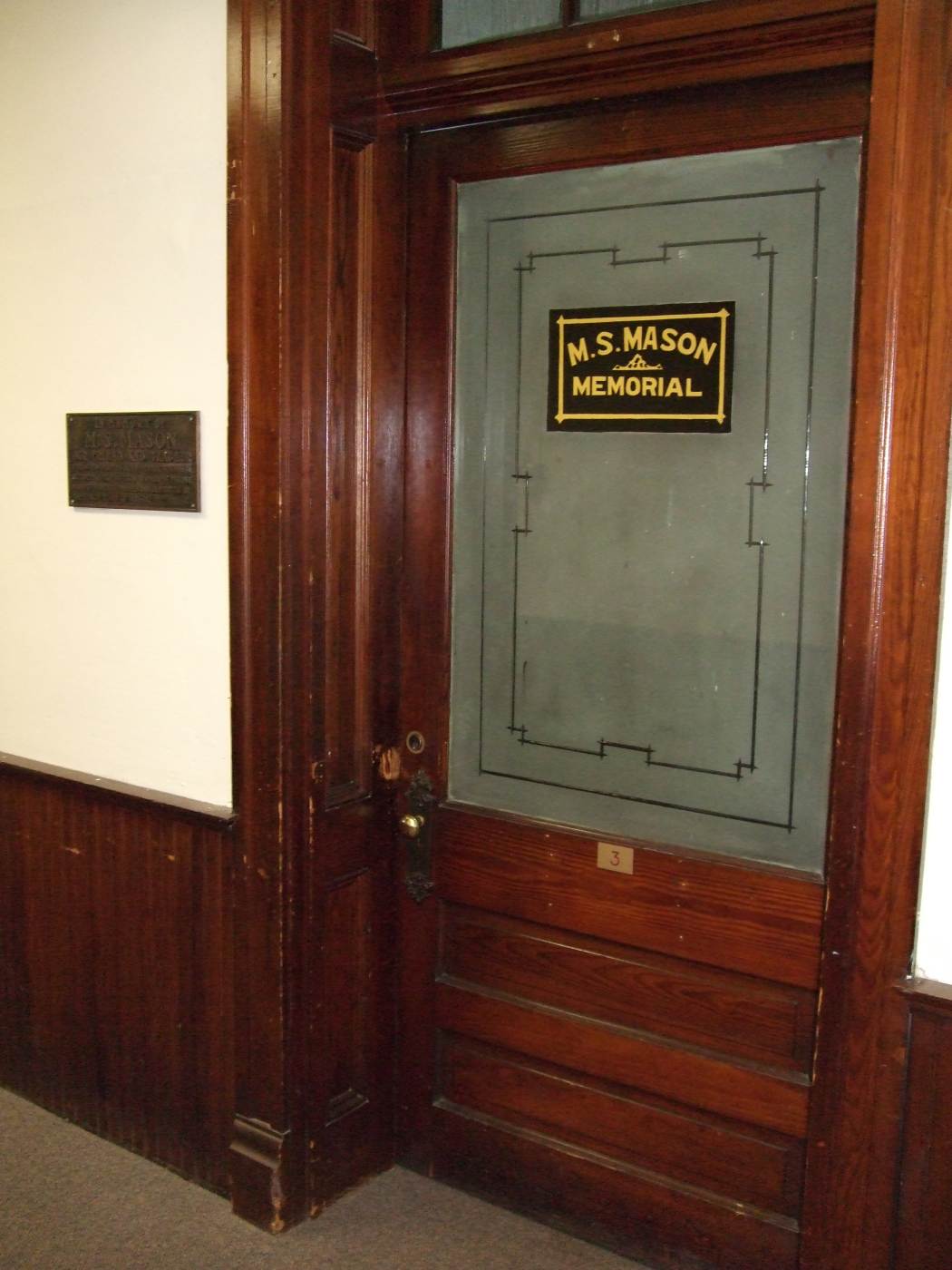
The M.S. Mason Room Lies In The SW Corner On The
Main Floor Of The F-HU Administration Building
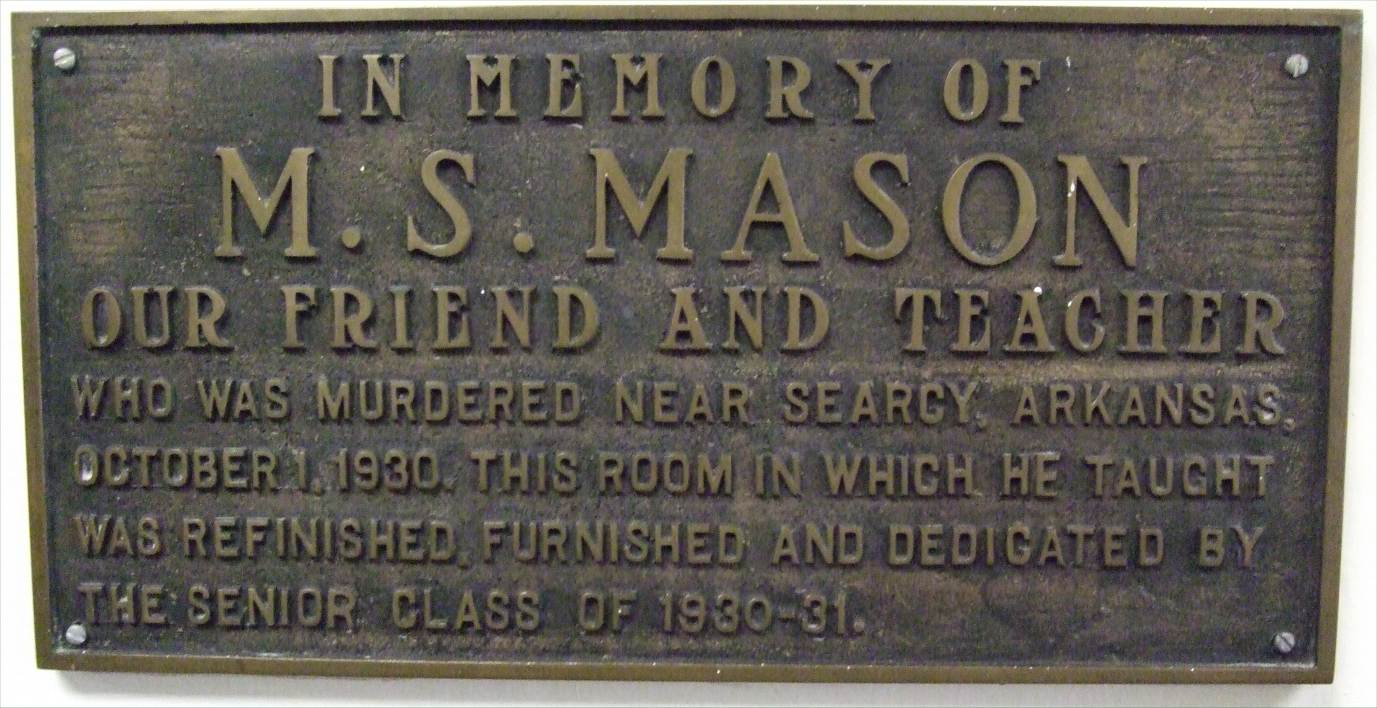
In Memory Of
M.S. MASON
Our Friend And Teacher
who was murdered near Searcy, Arkansas
October 1, 1930. This room is which he taught
was refinished, furnished and dedicated by
the Senior Class Of 1930-31.
![]()
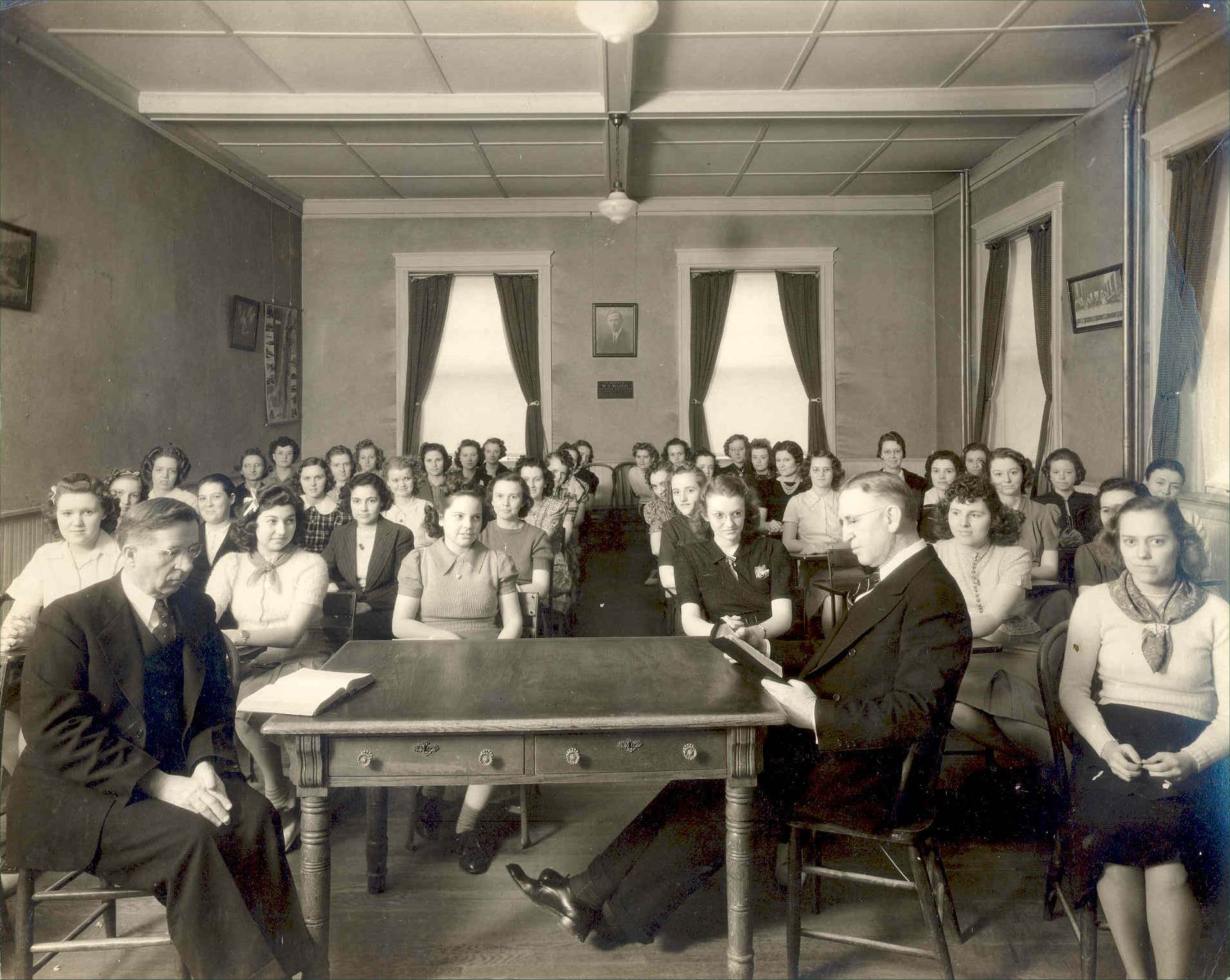
Above is the refurbished M.S. Mason Room,
sometime after 1930
In the foreground are W. Claude Hall (L)
and N.B. Hardeman (R)
Photo: Courtesy of Freed-Hardeman University
Directions To The Grave Of M.S. Mason
M.S. Mason and Winifred M.M. Showalter were buried in Springfield, Missouri in the Maple Park Cemetery. The cemetery is located in the center of Springfield at 300 W. Grand St. The office phone #(417)869-0217. The can assist you for the exact location. But when speaking with the office manager, she told me that you enter the cemetery at the only entrance, and make your way straight towards the rear of the cemetery. About 3/4 way stop the car and enter the center and to the east (left) for the plot. Look for "STEVENS/WOOD; MERIWETHER plots from the drive and it will be to the rear and right of them.
M.S. Mason - Southside
NW quarter Lot 76 Block 75
Winifred Mason Showalter - Center of NW quarter Lot 76 Block 75
![]()
Winifred Mason Moore Showalter
Feb. 14, 1885
Apr. 9, 1956
Marshall S.
May 20, 1882
Oct. 1, 1930
Special Thanks To Tom L. Childers For Photos On This Site
![]()
